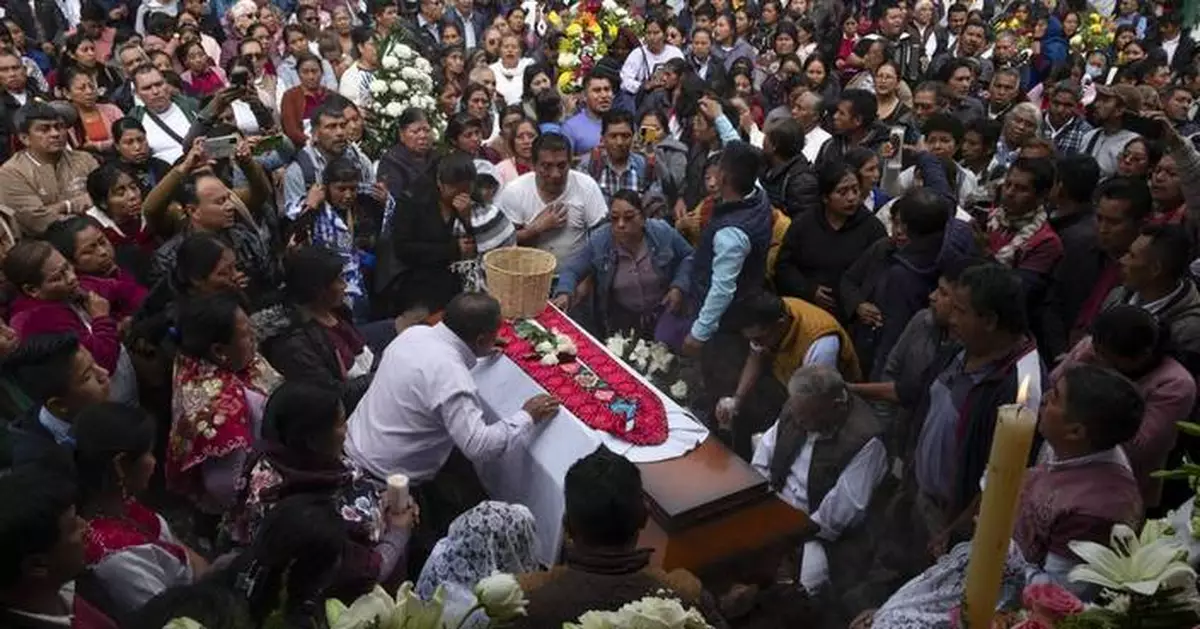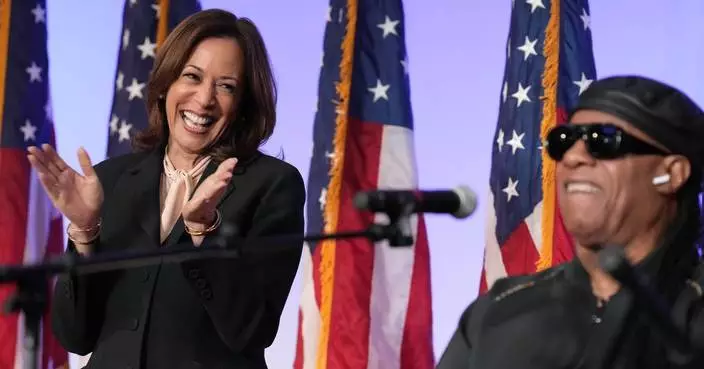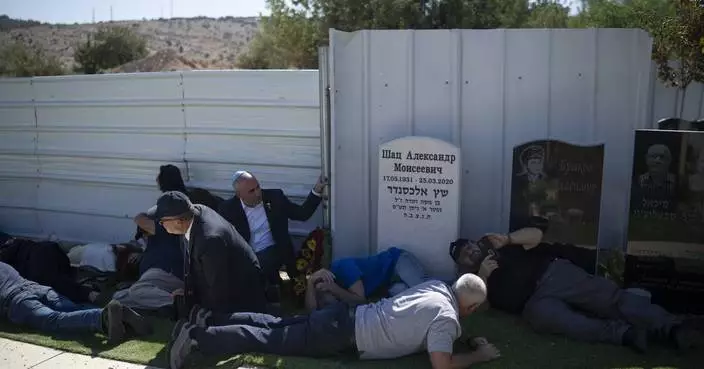SAN ANDRES LARRAINZAR, Mexico (AP) — Hundreds gathered Monday to mourn Catholic priest Marcelo Pérez, an activist for Indigenous peoples and farm laborers who was killed in the southern Mexico state of Chiapas.
It was a killing that many say was a tragedy foretold, in a state where drug cartels have caused thousands of people to flee their homes.
Mourners gathered in San Andres Larrainzar, near the city of San Cristobal de las Casas, where Pérez was killed on Sunday.
Pérez, a leading activist for peace in the violence-torn state, was from San Andrés Larrainzar. A mass in his honor Monday was held in Spanish and Tzotzil, the Indigenous language he spoke.
Pérez, 50, had often received threats, but nonetheless continued to work as a peace activist. Human rights advocates said Pérez did not receive the government protection he needed.
“For years, we insisted that the Mexican government should address the threats and aggressions against him, but they never implemented measures to guarantee his life, security and well-being,” The Fray Bartolome de las Casas human rights center wrote.
While there was no immediate information on the killers — President Claudia Sheinbaum only said that “investigations are being carried out” — Rev. Pérez's peace and mediation efforts may have angered one of the two drug cartels that are currently fighting for control of Chiapas.
The state is a lucrative route for smuggling both drugs and migrants.
“Father Marcelo Pérez was the subject of constant threats and aggressions on the part of organized crime groups,” according to the rights center, adding that his killing “occurred in the context of a serious escalation of violence against the public in all the regions of Chiapas.”
For at least the last two years, the Sinaloa and Jalisco cartels have been engaged in bloody turf battles that involve killing whole families, and forcing villagers to take sides in the dispute. Hundreds of Chiapas residents have had to flee to neighboring Guatemala for their own safety.
“They should look for an intelligent way to disarm those groups,” said Cardinal Felipe Arizmendi, who once served as the bishop for the area. “They shouldn't wait for people to file complaints, and people are going to file complaints because their lives are at risk.”
Together with continued drug violence in the northern state of Sinaloa, and the army killings of six migrants earlier this month, the killing of Pérez was another embarrassment for the government.
Sheinbaum took office Oct. 1 and has pledged to follow the policy of her predecessor and mentor, former president Andrés Manuel López Obrador, of not confronting the drug cartels. The policy has failed to significantly reduce violence.
“This is a reflection of the whole country,” Cardinal Arizmendi said following the mass for Pérez. “They shouldn't say everything is fine in Mexico. Please.” he continued. “This strategy has not worked.”
The state prosecutors’ office said Rev. Pérez was shot dead by two gunmen when he was in his van, just after he had finished celebrating Mass.
He served in the community for two decades and was known as a negotiator in conflicts in a mountainous region of Chiapas where crime, violence and land disputes are rife. Pérez also led several marches against violence, which has brought him several death threats.
The U.N. Human Rights Office said Pérez was the seventh human rights activist killed in Mexico so far in 2024.
Follow AP’s coverage of Latin America and the Caribbean at https://apnews.com/hub/latin-america
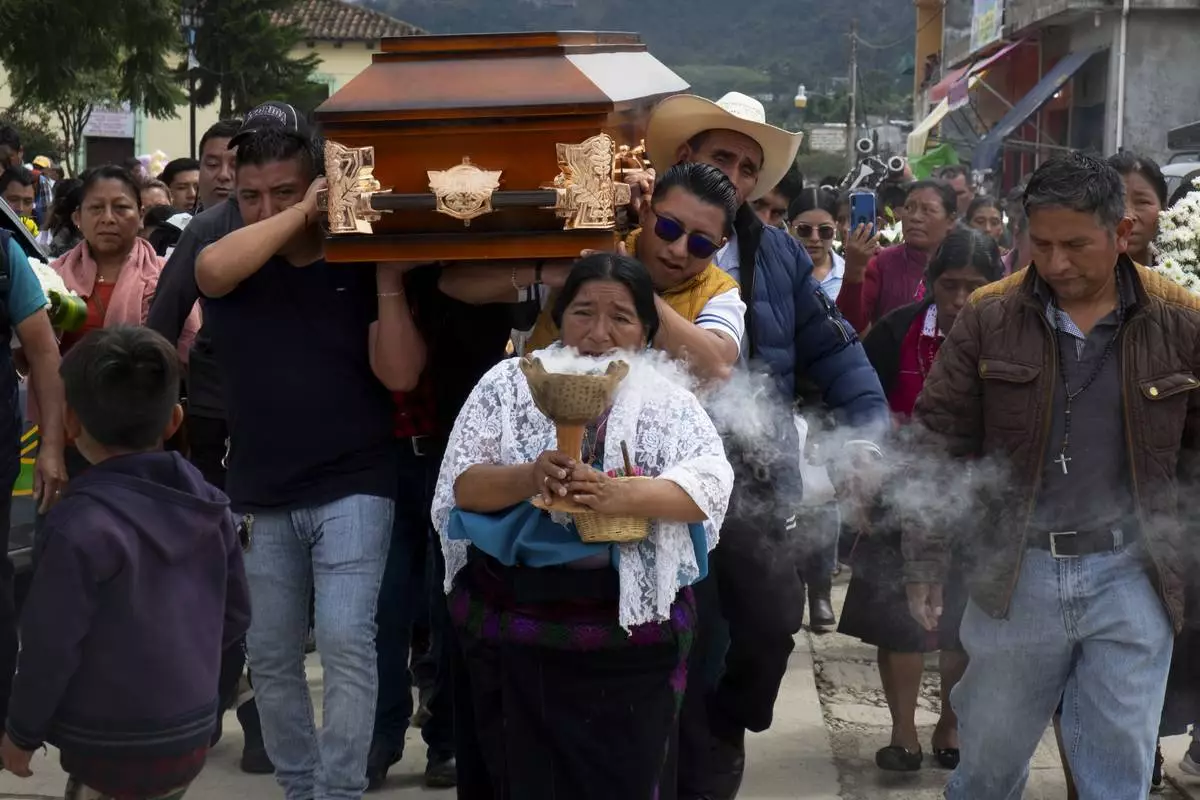
People carry the coffin of slain Catholic priest and activist Marcelo Pérez prior to a mass at the main plaza in San Andrés Larráinzar, Chiapas state, Mexico, Monday, Oct. 21, 2024. (AP Photo/Isabel Mateos)
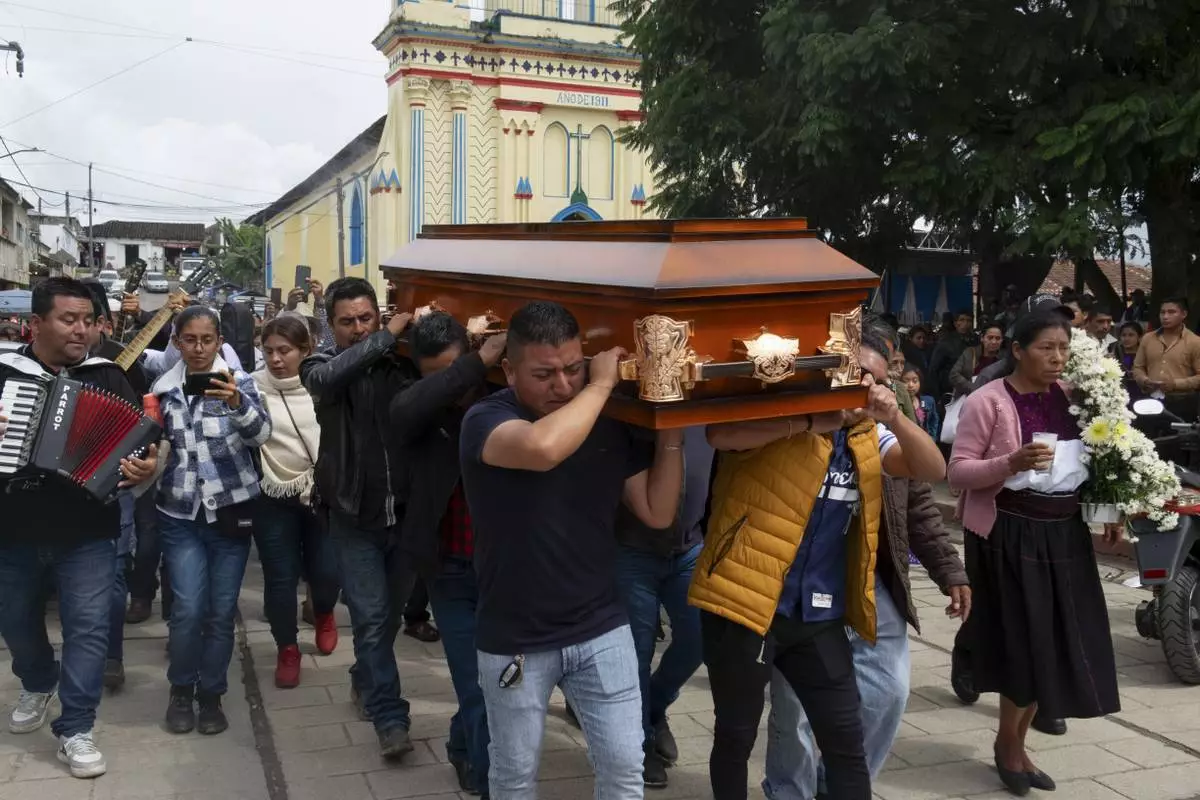
People carry the coffin of slain Catholic priest and activist Marcelo Pérez during a mass at the main plaza in San Andrés Larráinzar, Chiapas state, Mexico, Monday, Oct. 21, 2024. (AP Photo/Isabel Mateos)
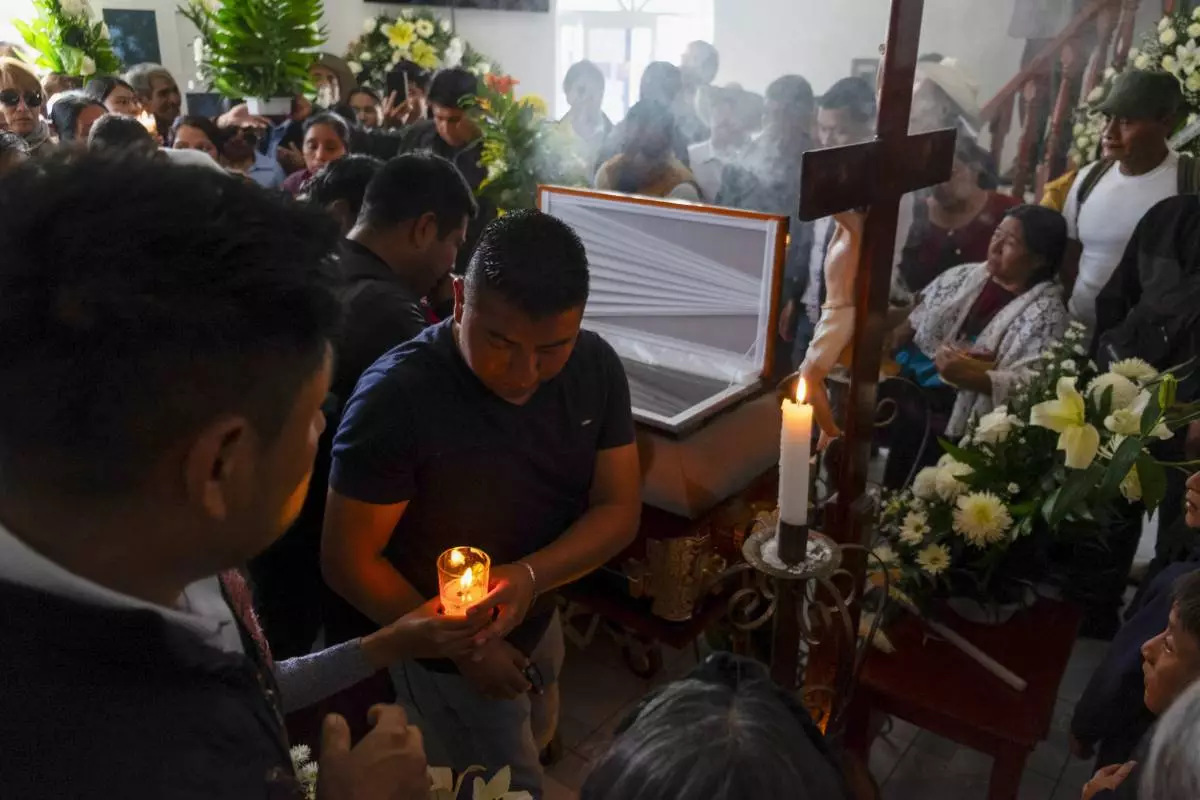
A man lights a candle next to the coffin of slain Catholic priest and activist Marcelo Pérez at the Pérez family's house, in San Andrés Larráinzar, Chiapas state, Mexico, Monday, Oct. 21, 2024. (AP Photo/Isabel Mateos)
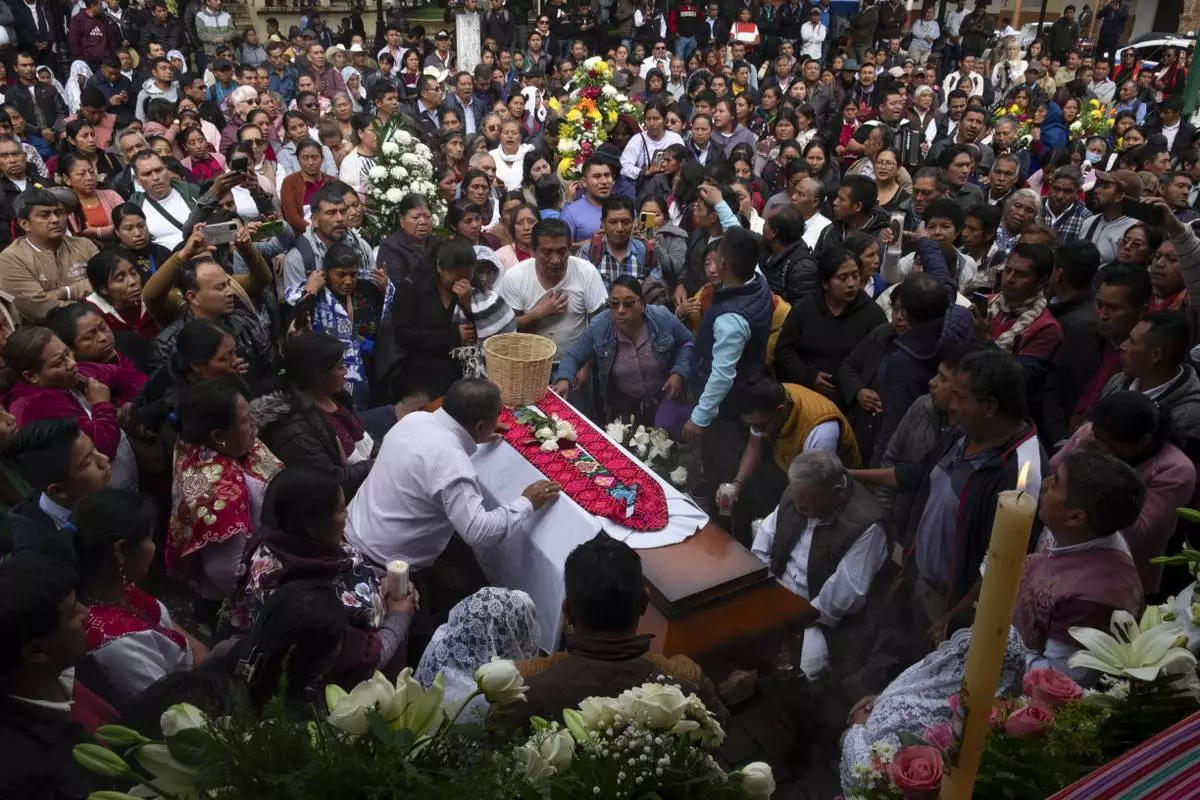
People gather around the coffin of slain Catholic priest and activist Marcelo Pérez during a mass at the main plaza in San Andrés Larráinzar, Chiapas state, Mexico, Monday, Oct. 21, 2024. (AP Photo/Isabel Mateos)
SAYLORSBURG, Pa. (AP) — Fethullah Gülen, a reclusive U.S.-based Islamic cleric who inspired a global social movement while facing unproven accusations that he masterminded a failed 2016 coup in his native Turkey, has died.
The Alliance for Shared Values, a New York-based group that promotes Gülen's work in the U.S., said that Gülen died Sunday night at a hospital near his home in Pennsylvania's Pocono Mountains. Monroe County Coroner Thomas Yanac Jr. said he was informed that Gülen, who was in his eighties and had long been in ill health, died of natural causes.
The group called him a “towering figure of faith, wisdom, intellectual and spiritual leadership" whose “impact will be felt for generations.”
Gülen spent the last decades of his life in self-exile, living in a gated compound and wielding influence among his millions of followers. He espoused a philosophy that blended Sufism — a mystical form of Islam — with staunch advocacy of democracy, education, science and interfaith dialogue.
Gülen had not played an active role in his movement in recent years. A group of close friends who have advised him for decades will carry on the work, according to the Alliance for Shared Values.
The religious leader began as an ally of Turkish leader Recep Tayyip Erdogan but became a foe. He called Erdogan an authoritarian bent on accumulating power and crushing dissent. Erdogan cast Gülen as a terrorist, accusing him of orchestrating the attempted military coup on July 15, 2016, when factions within the military used tanks, warplanes and helicopters to try to overthrow the government.
Heeding a call from the president, thousands took to the streets to oppose the takeover attempt. The coup plotters fired at crowds and bombed parliament and other government buildings. A total of 251 people were killed and around 2,200 others were wounded. Around 35 alleged coup plotters were killed.
Gülen adamantly denied involvement, and his supporters dismissed the charges as ridiculous and politically motivated. Turkey put Gülen on its most-wanted list and demanded his extradition, but the United States showed little inclination to send him back, saying it needed more evidence. He was never charged with a crime in the U.S., and he consistently denounced terrorism as well as the coup plotters.
Turkish Foreign Minister Hakan Fidan said Monday that Gülen’s death “will not make us complacent or relaxed. This organization has been a threat rarely seen in the history of our nation.” He called on Gülen’s followers to turn away from “this treasonous wrong path.”
In Turkey, Gülen’s movement — sometimes known as Hizmet, Turkish for “service” — has been subjected to a broad crackdown. The government arrested tens of thousands of people for their alleged link to the coup plot, sacked more than 130,000 suspected supporters from civil service jobs and more than 23,000 from the military, and closed hundreds of businesses, schools and media organizations tied to Gülen.
Gülen called the crackdown a witch hunt and denounced Turkey’s leaders as “tyrants.”
“The last year has taken a toll on me as hundreds of thousands of innocent Turkish citizens are being punished simply because the government decides they are somehow ‘connected’ to me or the Hizmet movement and treats that alleged connection as a crime,” he said on the first anniversary of the failed coup.
Ozgur Ozel, the leader of Turkey's main opposition Republican People's Party, said Gülen’s vast network remained a threat to Turkey.
“The founder is dead but the organization remains. No one should think that this danger has passed or is over. Everyone should be on guard against this organization," Ozel said.
On Monday, Turkey’s broadcasting regulator warned against content praising Gulen, saying no broadcaster can honor a “terrorist.” Meanwhile, prosecutors in the northwestern province of Bursa launched an investigation into a journalist on possible charges of engaging in terrorist propaganda, the state-run Anadolu Agency reported, after she said she hoped he would rest in heaven.
Abdulhamit Bilici, who was editor of the Gulen-affiliated Zaman newspaper when Erdogan shut it down in early 2016, said Monday that Gulen was subjected to decades of persecution in Turkey, and that Turkey is the only nation that claims Gülen’s peaceful Hizmet movement is a terror group.
“He was a source of inspiration for millions of people, not just in Turkey, but around the world,” Bilici said in an interview at the Pennsylvania retreat center where Gulen lived. "So this is a very sad day and a day of reflection, mourning and thinking and prayer.”
Fethullah Gülen was born in Erzurum, in eastern Turkey. His official birth date was April 27, 1941, but that has long been in dispute. Y. Alp Aslandogan, who leads a New York-based group that promotes Gülen’s ideas and work, said Gülen was actually born sometime in 1938.
Trained as an imam, or prayer leader, Gülen gained notice in Turkey some 50 years ago. He preached tolerance and dialogue between faiths — meeting with Pope John Paul II in 1998 — and he believed religion and science could go hand in hand. His belief in merging Islam with Western values and Turkish nationalism struck a chord with Turks, earning him millions of followers.
Gülen’s acolytes built a loosely affiliated global network of charitable foundations, professional associations, businesses and schools in more than 100 countries, including 150 taxpayer-funded charter schools throughout the United States. In Turkey, supporters ran universities, hospitals, charities, a bank and a large media empire with newspapers and radio and TV stations.
But Gülen was viewed with suspicion by some in his homeland, a deeply polarized country split between those loyal to its fiercely secular traditions and supporters of the Islamic-based party associated with Erdogan that came to power in 2002.
Gülen had long refrained from openly supporting any political party, but his movement forged a de facto alliance with Erdogan against the country’s old guard of staunch, military-backed secularists, and Gülen’s media empire threw its weight behind Erdogan’s Islamic-oriented government.
Gülenists helped the governing party win multiple elections. But the Erdogan-Gülen alliance began to crumble after the movement criticized government policy and exposed alleged corruption among Erdogan’s inner circle. Erdogan, who denied the allegations, grew weary of the growing influence of Gülen’s movement.
The Turkish leader accused Gülen’s followers of infiltrating the country’s police and judiciary and setting up a parallel state and began agitating for Gülen’s extradition to Turkey even before the failed 2016 coup.
The cleric had lived in the United States since 1999 when he came to seek medical treatment.
In 2000, with Gülen still in the U.S., Turkish authorities charged him with leading an Islamist plot to overthrow the country’s secular form of government and establish a religious state.
Some of the accusations against him were based on a tape recording on which Gülen was alleged to have told supporters of an Islamic state to bide their time: “If they come out too early, the world will quash their heads.” Gülen said his comments were taken out of context.
The cleric was tried in absentia and acquitted but never returned to his homeland. He won a lengthy legal battle against the administration of then-President George W. Bush to obtain permanent residency in the U.S.
Rarely seen in public, Gülen lived quietly on the grounds of an Islamic retreat center. He left mostly only to see doctors for ailments that included heart disease and diabetes, spending much of his time in prayer and meditation and receiving visitors from around the world.
Gülen never married and did not have children.
Associated Press writer Suzan Fraser in Ankara, Turkey, contributed to this report.
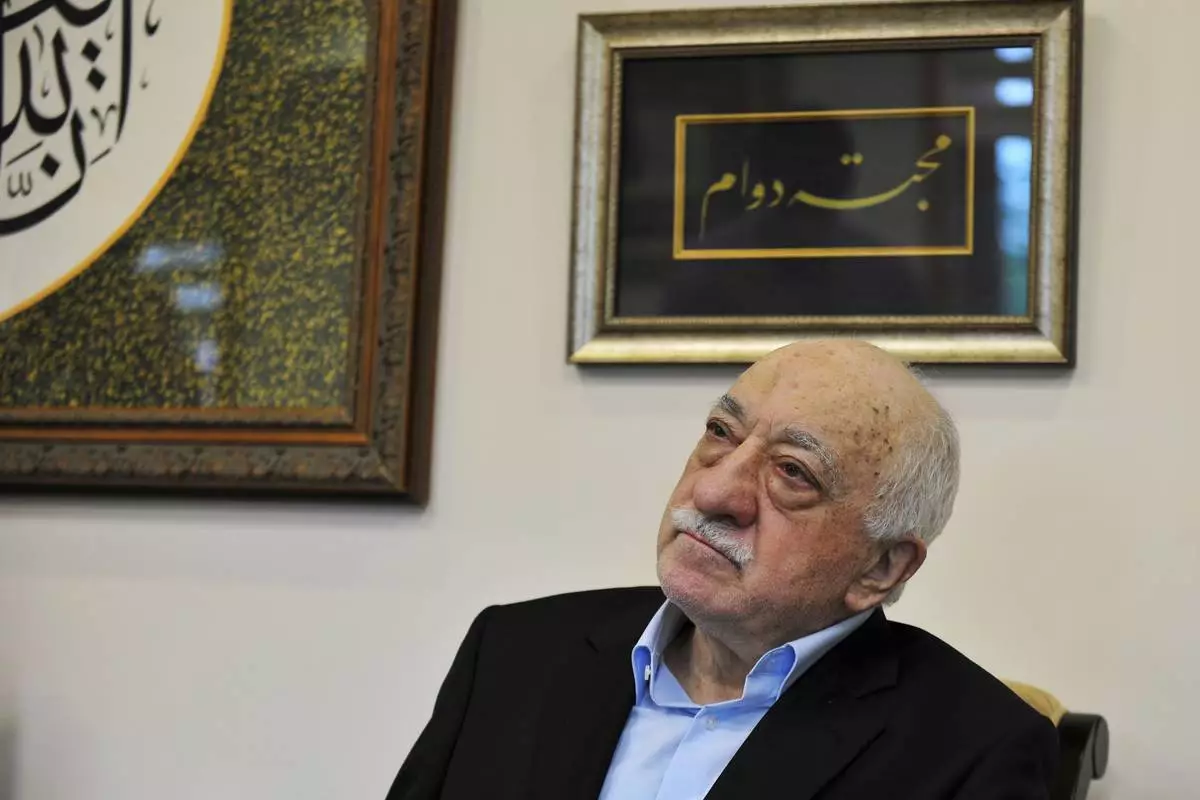
FILE - Turkish Islamic cleric Fethullah Gulen meets members of the media at his compound in Saylorsburg, Pa. in July 2016. (AP Photo/Chris Post, File)
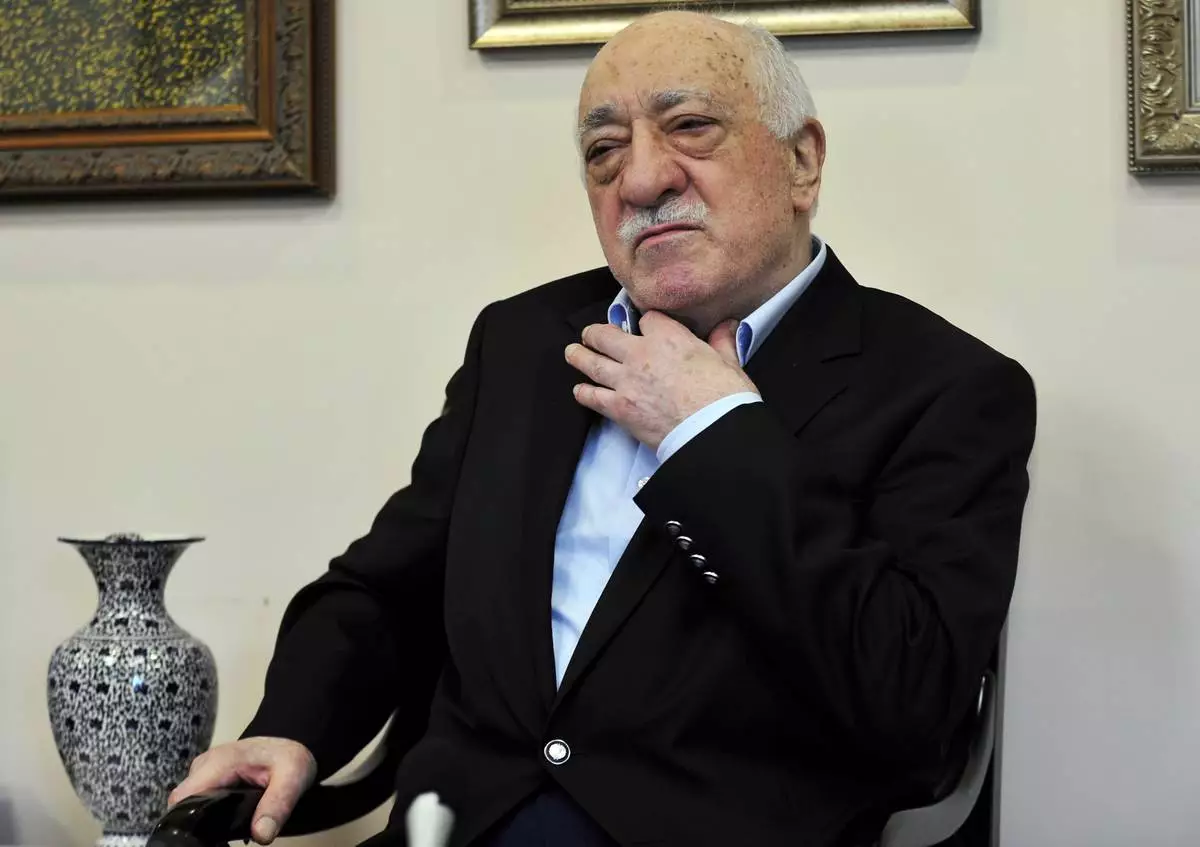
FILE - Turkish Islamic cleric Fethullah Gulen meets members of the media at his compound in Saylorsburg, Pa. in July 2016. (AP Photo/Chris Post, File)
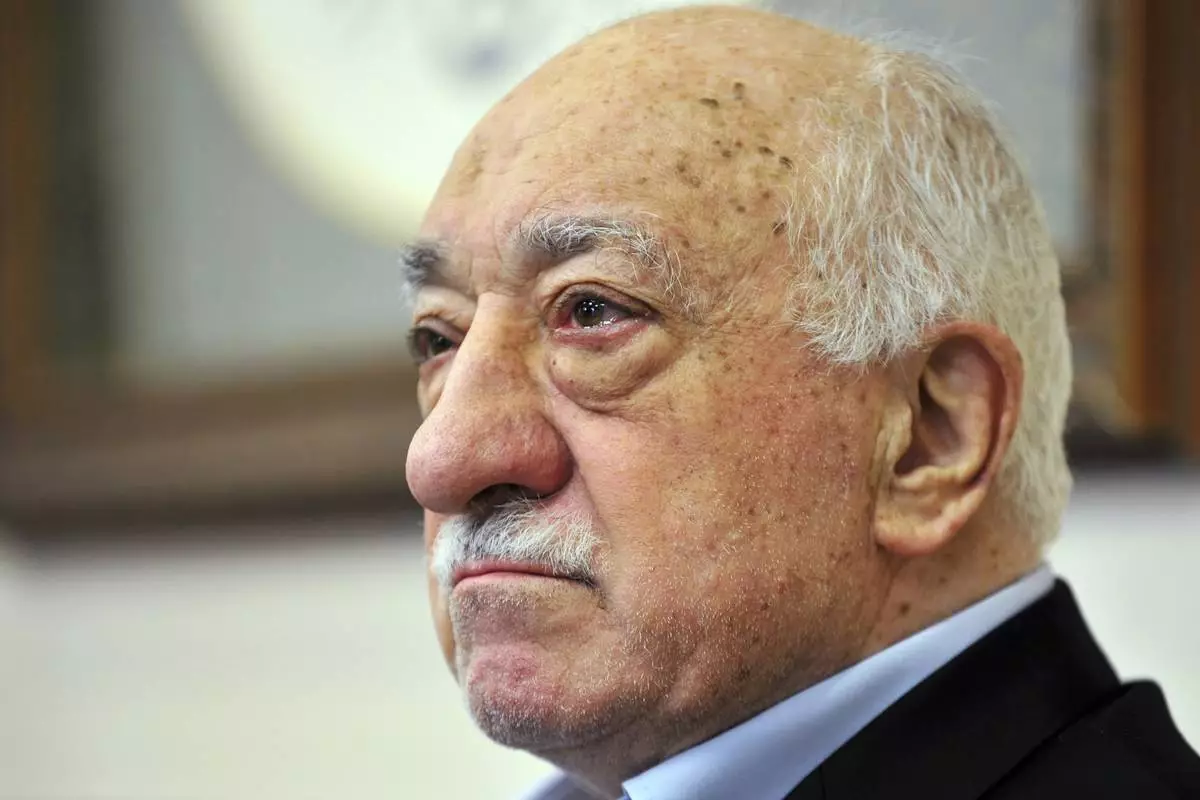
FILE - Turkish Islamic cleric Fethullah Gulen meets members of the media at his compound in Saylorsburg, Pa. in July 2016. (AP Photo/Chris Post, File)
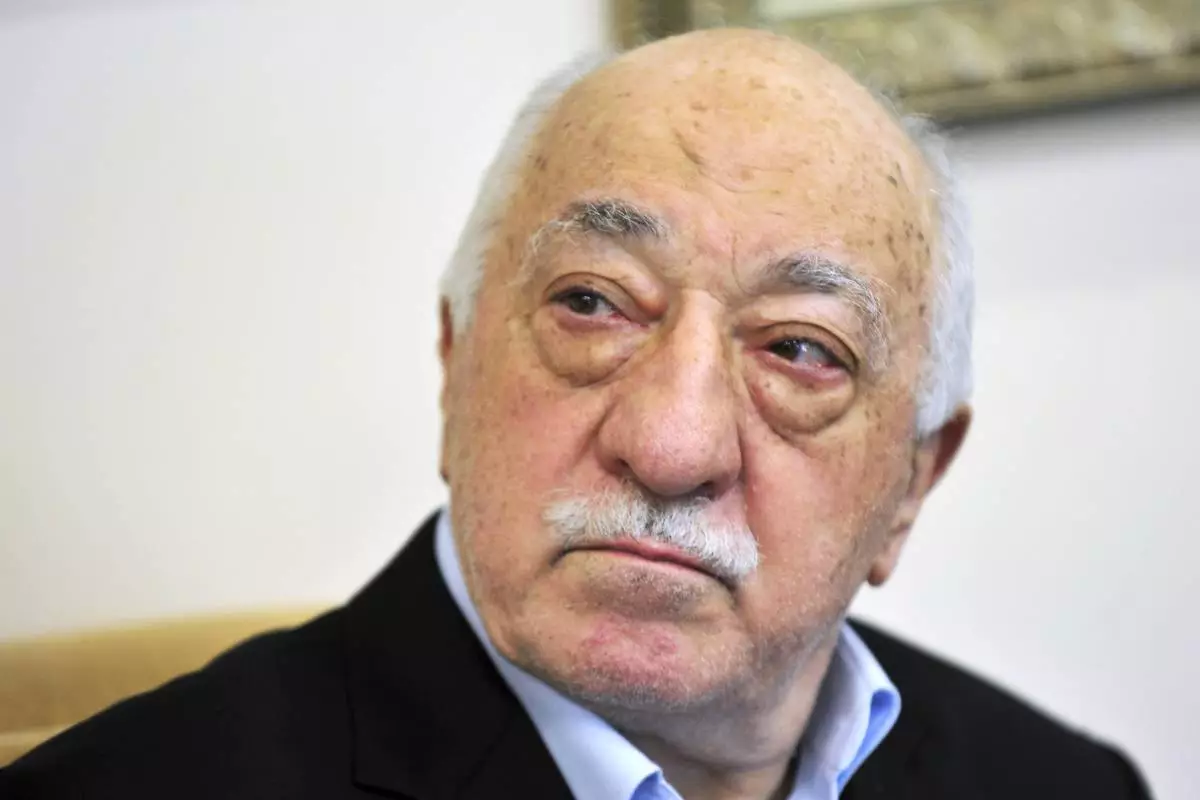
FILE - Turkish Islamic cleric Fethullah Gulen speaks to members of the media at his compound in Saylorsburg, Pa. in July 2016. (AP Photo/Chris Post, File)






